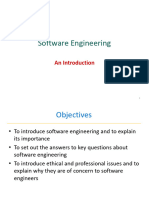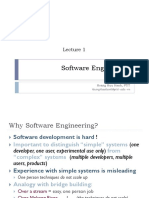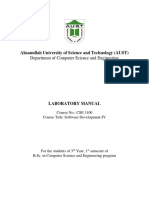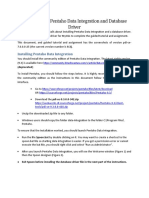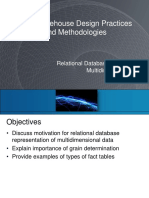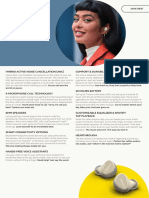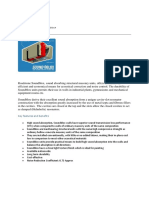Software Development
Introduction to Computer-based
System Engineering
Engr. Abdul-Rahman Mahmood
MS, MCP, QMR(ISO9001:2000)
Usman Institute of Technology University Road, Karachi
armahmood786@yahoo.com
alphasecure@gmail.com
http://alphapeeler.sourceforge.net
alphapeeler.sf.net/pubkeys/pkey.htm
pk.linkedin.com/in/armahmood
http://alphapeeler.tumblr.com
www.twitter.com/alphapeeler
armahmood786@jabber.org
www.facebook.com/alphapeeler
alphapeeler@aim.com
abdulmahmood-sss
alphasecure
mahmood_cubix
48660186
armahmood786@hotmail.com
alphapeeler@icloud.com
VC++, VB, ASP
�Software engineering
The economies of ALL developed nations are
dependent on software.
More and more systems are software controlled
Software engineering is concerned with theories,
methods and tools for professional software
development.
Expenditure on software represents a
significant fraction of GNP in all developed countries.
�Software costs
Software costs often dominate computer system costs.
The costs of software on a PC are often greater than the
hardware cost.
Software costs more to maintain than it does to
develop. For systems with a long life, maintenance
costs may be several times development costs.
Software engineering is concerned with cost-effective
software development.
�FAQs about software
engineering
What is software?
What is software engineering?
What is the difference between software engineering
and computer science?
What is the difference between software engineering
and system engineering?
What is a software process?
What is a software process model?
�FAQs about software
engineering
What are the costs of software engineering?
What are software engineering methods?
What is CASE (Computer-Aided Software
Engineering)
What are the attributes of good software?
What are the key challenges facing software
engineering?
�What is software?
Computer programs and associated documentation such as
requirements, design models and user manuals.
Software products may be developed for a particular
customer or may be developed for a general market.
Software products may be
Generic - developed to be sold to a range of different customers e.g.
PC software such as Excel or Word.
Bespoke (custom) - developed for a single customer according to
their specification.
New software can be created by developing new programs,
configuring generic software systems or reusing existing
software.
�What is software engineering?
Software engineering is an engineering discipline that
is concerned with all aspects of software production.
Software engineers should adopt a systematic and
organised approach to their work and use appropriate
tools and techniques depending on the problem to be
solved, the development constraints and the resources
available.
�What is the difference between software
engineering and computer science?
Computer science is concerned with theory and
fundamentals; software engineering is concerned with
the practicalities of developing and delivering useful
software.
Computer science theories are still insufficient to act
as a complete underpinning for software engineering
(unlike e.g. physics and electrical engineering).
�What is the difference between software
engineering and system engineering?
System engineering is concerned with all aspects of
computer-based systems development including
hardware, software and process engineering. Software
engineering is part of this process concerned with
developing the software infrastructure, control,
applications and databases in the system.
System engineers are involved in system specification,
architectural design, integration and deployment.
�What is a software process?
A set of activities whose goal is the development or
evolution of software.
Generic activities in all software processes are:
Specification - what the system should do and its
development constraints
Development - production of the software system
Validation - checking that the software is what the
customer wants
Evolution - changing the software in response to
changing demands.
�What is a software process
model?
A simplified representation of a software process,
presented from a specific perspective.
Examples of process perspectives are
Workflow perspective - sequence of activities;
Data-flow perspective - information flow;
Role/action perspective - who does what.
Generic process models
Waterfall;
Iterative development;
Component-based software engineering.
�What are the costs of software engineering?
Roughly 60% of costs are development costs, 40% are
testing costs. For custom software, evolution costs
often exceed development costs.
Costs vary depending on the type of system being
developed and the requirements of system attributes
such as performance and system reliability.
Distribution of costs depends on the development
model that is used.
�Activity cost distribution
Waterfall mod el
0
25
Sp ecificatio n
50
Design
100
75
Develo pment
Integ ration and testin g
Iterative develo pmen t
0
25
Sp ecificatio n
50
Iterativ e d evelop men t
Co mpo nent-based so ftware en g
0
System testin g
50
Integ ration and testin g
Develo pment an d evolu tion costs for lo ng -lifetime sy st
10
ems
200
System d ev elop ment
1 00
75
Develo pment
1 00
ineerin g
25
Sp ecificatio n
75
400
30
System evo lu tion
25
50
75
Product development costs
Sp ecificatio n
Develo pmen t
System testin g
100
�What are software engineering methods?
Structured approaches to software development which
include system models, notations, rules, design advice and
process guidance.
Model descriptions
Descriptions of graphical models which should be produced;
Rules
Constraints applied to system models;
Recommendations
Advice on good design practice;
Process guidance
What activities to follow.
�What is CASE (Computer-Aided Software
Engineering)
Software systems that are intended to provide automated
support for software process activities.
CASE systems are often used for method support.
Upper-CASE
Tools to support the early process activities of requirements and
design;
Lower-CASE
Tools to support later activities such as programming, debugging
and testing.
�What are the attributes of good software?
The software should deliver the required functionality and
performance to the user and should be maintainable,
dependable and acceptable.
Maintainability
Software must evolve to meet changing needs;
Dependability
Software must be trustworthy;
Efficiency
Software should not make wasteful use of system resources;
Acceptability
Software must accepted by the users for which it was designed. This
means it must be understandable, usable and compatible with
other systems.
�What are the key challenges facing software
engineering?
Heterogeneity, delivery and trust.
Heterogeneity
Developing techniques for building software that can cope with
heterogeneous platforms and execution environments;
Delivery
Developing techniques that lead to faster delivery of software;
Trust
Developing techniques that demonstrate that software can be
trusted by its users.
�Professional and ethical
responsibility
Software engineering involves wider responsibilities
than simply the application of technical skills.
Software engineers must behave in an honest and
ethically responsible way if they are to be respected as
professionals.
Ethical behaviour is more than simply upholding the
law.
�Issues of professional
responsibility
Confidentiality
Engineers should normally respect the confidentiality of
their employers or clients irrespective of whether or not
a formal confidentiality agreement has been signed.
Competence
Engineers should not misrepresent their level of
competence. They should not knowingly accept work
which is outwith their competence.
�Issues of professional
responsibility
Intellectual property rights
Engineers should be aware of local laws governing the use of
intellectual property such as patents, copyright, etc. They should be
careful to ensure that the intellectual property of employers and
clients is protected.
Computer misuse
Software engineers should not use their technical skills to misuse
other peoples computers. Computer misuse ranges from relatively
trivial (game playing on an employers machine, say) to extremely
serious (dissemination of viruses).
�ACM/IEEE Code of Ethics
The professional societies in the US have cooperated
to produce a code of ethical practice.
Members of these organisations sign up to the code of
practice when they join.
The Code contains eight Principles related to the
behaviour of and decisions made by professional
software engineers, including practitioners, educators,
managers, supervisors and policy makers, as well as
trainees and students of the profession.
�Code of ethics - preamble
Preamble
The short version of the code summarizes aspirations at a high level
of the abstraction; the clauses that are included in the full version
give examples and details of how these aspirations change the way
we act as software engineering professionals. Without the
aspirations, the details can become legalistic and tedious; without
the details, the aspirations can become high sounding but empty;
together, the aspirations and the details form a cohesive code.
Software engineers shall commit themselves to making the analysis,
specification, design, development, testing and maintenance of
software a beneficial and respected profession. In accordance with
their commitment to the health, safety and welfare of the public,
software engineers shall adhere to the following Eight Principles:
�Code of ethics - principles
PUBLIC
Software engineers shall act consistently with the public interest.
CLIENT AND EMPLOYER
Software engineers shall act in a manner that is in the best interests
of their client and employer consistent with the public interest.
PRODUCT
Software engineers shall ensure that their products and related
modifications meet the highest professional standards possible.
�Code of ethics - principles
JUDGMENT
Software engineers shall maintain integrity and independence in
their professional judgment.
MANAGEMENT
Software engineering managers and leaders shall subscribe to and
promote an ethical approach to the management of software
development and maintenance.
PROFESSION
Software engineers shall advance the integrity and reputation of the
profession consistent with the public interest.
�Code of ethics - principles
COLLEAGUES
Software engineers shall be fair to and supportive of
their colleagues.
SELF
Software engineers shall participate in lifelong learning
regarding the practice of their profession and shall
promote an ethical approach to the practice of the
profession.
�Ethical dilemmas
Disagreement in principle with the policies of senior
management.
Your employer acts in an unethical way and releases a
safety-critical system without finishing the testing of
the system.
Participation in the development of military weapons
systems or nuclear systems.































